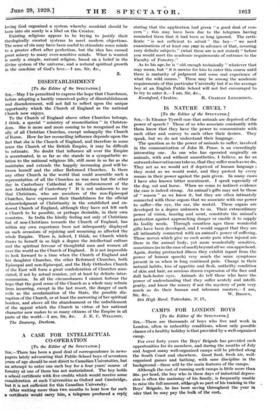DISESTABLISHMENT [To the Editor of the SPEcre.roa.] SIR, —May I be
perMitted to express the hope that Churchmen, before adopting a hastily conceived policy of disestablishment and disendowment, will not fail to reflect upon the unique opportunity which the Church of England as the national Church now enjoys.
To the Church of England above other Churches belongs, I think, a special " ministry of reconciliation " in Christen- dom. She is more and more coming to be recognized as the ally of all Christian Churches, except unhappily the Church of Rome. How far her reconciling influence depends upon the fact that she is the Church of England, and therefore in some sense the Church of the British Empire, it may be difficult to estimate. No doubt that influence all over the Empire is accentuated, in so far as she stands in a sympathetic re- lation to the national religious life, still more in so far as she maintains and extends the happily increasing good will be- tween herself and the other Reformed Churches. Is there any other Church in the world that could assemble such a representation of all the Churches as was .seen but the other day in Canterbury Cathedral at the enthronement of the new Archbishop of Canterbury ? It is not unknown to me that Christians, who are members of the non-Episcopal Churches, have expressed their thankfulness for the official acknowledgment of Christianity in the established and en- dowed Church of England, although they have not felt such a Church to be possible, or perhaps desirable, in their own countries. In India the kindly feeling not only of Christians but of non-Christians towards the Church of England, has within my own experience been not infrequently displayed on such occasions of rejoicing and mourning as affected the whole Empire. There is, indeed, I think, no Church which draws to herself in so high a degree the intellect's' culture and the spiritual fervour of thoughtful men and women all over the world as the Church of England. It is not impossible to look forward to a time when the Church of England and her daughter Churches, the other Reformed Churches, both Episcopal and non-Episcopal, and the Holy Orthodox Church of the East will form a great confederation of Churches asso- ciated, if not by actual reunion, yet at least by definite inter- communion. In all the circumstances I cannot forbear the hope that the good sense of the Church as a whole may refrain from incurring, except in the last resort, the danger of such evils as the secularization of the State, the possible dis- ruption of the Church, or at least the narrowing of her spiritual borders, and above all the abandonment or the enfeeblement of the appeal which the Church in virtue of her national








































 Previous page
Previous page